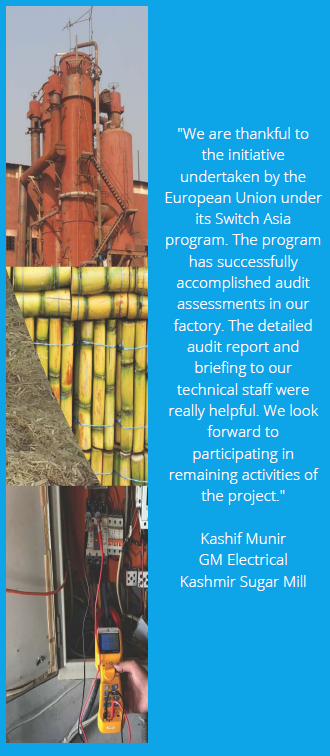Implementation of Resource and Energy Efficient Technologies (IREET) in the Sugar Sector of Pakistan

Duration: March 2018 to February 2022
Budget: €1.436 million (EU contribution: 79.77%)
Location: Sindh, KPK, and Punjab
Implementing Partners: Iqbal Hamid Trust (IHT), Pakistan
Collaborating Centre on Sustainable Consumption
and Production (CSCP), GmbH, Germany
Rapid economic growth in Asia has come at a cost of increased use of natural resources, growing Greenhouse Gas (GHG) emissions and large amounts of waste. Sustainable Consumption and Production (SCP) aims at improving the overall environmental performance of products throughout their life cycle, stimulates demand for better products and production technologies and helps consumers make informed choices. The European Union is committed to tackle these global challenges and is supporting the sugar mills of Pakistan in adoption of resource and energy efficient (R&EE) technologies under the current project.
The challenge
Most of the sugar mills in Pakistan use outdated technologies and production practices resulting in high inefficiencies, wastage of natural resources and increased cost of production. There is significant potential for upgrading the production process in the industry to save bagasse (a by-product of the sugarcane crushing process), being burnt inefficiently for power generation. However, the costs for these assessments have proven to be too high for many sugar mills. Through the programme, the EU is supporting detailed assessments of sugar mills as well as overcoming other regulatory and financial barriers in the uptake of cleaner production practices.
How do we address the challenge?
About 70% of the bagasse produced during sugar production is consumed by the industry itself to meet its energy requirements. Bagasse consumption can be significantly reduced by introducing energy efficient technologies, adoption of best practices and appropriate retrofitting. The saved bagasse will be used to generate surplus electricity for feeding into the national grid. The project will undertake audits of sugar mills to identify and propose measures to improve resource efficiency and greenhouse gas reductions.
Support to policy
Through the programme, the EU is supporting the revision of the National Energy Conservation Policy to include resource and energy efficiency (R&EE) measures in the sugar sector. The programme will work with the State Bank of Pakistan for development of financing and credit guarantee schemes for R&EE projects.
EU in Pakistan
The European Union (EU) funds projects and programmes around the world in order to help addressing global and local challenges. The reduction of poverty and the respect of fundamental rights and freedoms are key objectives in this context.
In Pakistan, the EU is committed to a stable, democratic and pluralistic country that respects human rights and benefits from its full economic potential by supporting sustainable and inclusive development for all its citizens. The EU provides Pakistan with about €100 million annually in grants for development and cooperation. Among other issues, the EU supports Pakistan in its efforts to tackle poverty, increase education, promote good governance, human rights, rule of law and ensure sustainable management of natural resources. EU-funded projects are covering all of Pakistan with a special focus on Sindh and Balochistan.
The collaboration between the European Union and Pakistan is grounded in the Strategic Engagement Plan (SEP) signed in 2019. Areas of cooperation under the SEP include peace and security, democracy, rule of law, human rights, and migration but also sectors such as energy, climate change and science and technology.
The EU is one of Pakistan’s largest trading partners. The EU supports Pakistan’s integration into the world economy and its sustainable economic development, namely by granting it preferential access to the European single market under the GSP+ system since 2014. Under this scheme almost 80% of Pakistan’s exports enter the EU duty and quota free. In 2018, Pakistani exports to the EU were worth €6.9 billion.
In order to enjoy the trade preferences under GSP+, Pakistan needs to demonstrate progress on the implementation of 27 international conventions on human rights, good governance, labour rights and environmental protection. "
Delegation of the European Union to Pakistan,
House 9, Street 88, G-6/3, Islamabad
Phone: +92 51 227 1828, Fax: +92 51 282 2604
Email: [email protected]
To report any irregularities contact us on [email protected]





